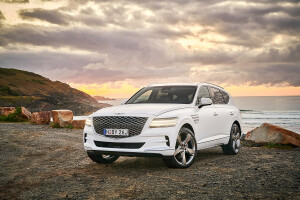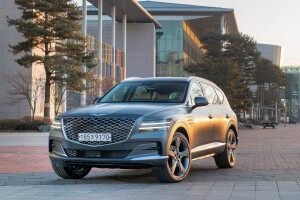Latest Review
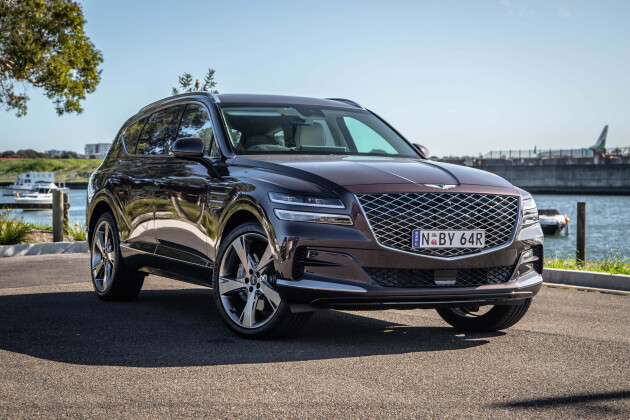
2022 Genesis GV80 3.0d review: Luxury Package
The big Genesis GV80 is chocka-block with features and musters up a genuine challenge for Audi’s Q7, BMW X5 and the Lexus RX
Genesis was a bit of a slow burn for Hyundai. Originally the name of a very nice executive sedan, it later became a brand in its own right, in much the same way Ioniq did. Taking the path that Toyota took with Lexus, the luxury brand from South Korea now faces up to the prestige car market with a mix of SUVs and sedans.
Its biggest, the GV80, is a genuine presence on the road. A distinctive but, I think, genuinely beautiful exterior design is backed by an impressive interior and a healthy aftersales package to build confidence in the brand.
Genesis needs all of these things because it’s not like the market is short of seven-seat premium SUVs with badges people have known and bought for decades.
Taking on the luxury market isn’t easy – ask Nissan about how Infiniti went outside of the US – and in this sector, even less so. The GV80 has its work cut out.
Pricing and features
While you can get a rear-wheel drive 2.5-litre turbo four-cylinder GV80 for well under a hundred grand, the GV80 3.0d starts at $104,191 before on-road costs – which is well in the ballpark of the Audi Q7, exactly what you might expect for a seven-seat V6-powered luxury SUV.
Highlights
A 14.5-inch screen runs Genesis’ own media and vehicle settings software in a fairly sober scheme that is a cross between BMW’s iDrive tiles and the old Mercedes-Benz Comand interface.
It has the obligatory DAB+ digital radio, along with Apple CarPlay and Android Auto, both wired (only low-spec Hyundai models with the smaller screens have wireless – it's baffling and related to supplier issues), and it’s all very crisp and clear. It’s fantastic to use and easy to navigate, and the Luxury Pack fitted to the model tested here adds a very impressive augmented reality sat-nav display.
The system is easy to use if you stick to using it as a touchscreen, which might be tough for those with shorter arms (which would be inconvenient if your pockets are deep enough to fork out for a GV80).
Joking aside, the easier-to-reach rotary controller in the centre console is oddly counterintuitive and I completely failed to gel with it. That could just have been me or the fact I just plugged in my phone and drove off most of the time.
Safety equipment
Genesis’ forward AEB covers both high and low speeds and features pedestrian detection. Unlike its Santa Fe relative, the curtain airbags reach all the way to the third row.
The furthest row does not have ISOFIX points or top tether anchors, whereas the middle row has two of the former and three of the latter in seven-seat versions.
The $13,500 six-seat Luxury Package – as fitted to this car – adds a hefty list of additions while deleting a seat to accommodate some of them.
Luxury Package
…and a few other bits and pieces. It’s a big headline number but it comes with a surprising amount of stuff – if you’re used to Euro pricing – so Genesis is kind of making it a no-brainer box to tick.
You can get all the same stuff but retain the seventh seat – while losing the luxurious rear console – for $10,000.
Three of the ten available colours are a whopping $2000 (Melbourne Grey, Matterhorn White, Brunswick Green), while the rest are freebies, which is comforting given the already six-figure price tag.
Comfort and space
The GV80 is a lot of car and it looks like even more because it’s riding on huge 22-inch wheels with racy fastback styling. With all rows in play, there’s not much boot space; somewhere between 200 and 300 litres.
Electrical seat folding does what it says on the tin and with the 50:50 split-fold activated, delivers 727 litres of cargo capacity, which is probably handier than the actual third row.
With the second row folded (also electrically), you have 2144 litres available to you, although you might want to keep an eye on protecting the rear centre console if your GV80 is in six-seat format.
On that note, the 8.3-inch entertainment screens hanging off the front seats also tend to get in the way when you’re folding the seats either for third-row access or to create the biggest load area.
With all the seats in use, the third row will take two smaller humans.
There isn’t a great deal of headroom but some light does get through the window so it’s not too dark, but definitely an occasional-use-only proposition. You get cup holders and air vents and there’s even an intercom system between the front and rear seats so you don’t have to bellow.
The middle row in the six-seater features two seats that are almost the same as the front seats. It’s not as roomy as you might expect for such a big car, but it’s still pretty impressive for knee and headroom. Foot room is a little limited if the front seat is all the way down but I can tell you that my wife and I had a picnic in the back and we were very comfortable.
For second-row passengers, the centre console has a similar set-up to that up front, with a storage bin covered by a two-piece leather-wrapped armrest, cup holders, another media controller and a wireless phone charger.
You also have your own climate controls and vents as well as window blinds. The seats are powered and heated, too. All that’s missing is the decadent massage functionality.
Being Hyundai’s version of Lexus, Genesis could have fallen into the trap of slipping in the odd familiar switch and screen here or there. While I’m sure there are common bits and pieces, there is absolutely nothing obvious to suggest the designers raided the Santa Fe/Palisade parts bin to keep costs under control.
Restrained use of colour, wood and textures creates a plush, luxury environment that you don’t always get in the Germans and only the new Lexus RX feels anything like this for similar money.
The Nappa leather feels genuinely expensive and the attention to detail around the cabin, even the suede-like headlining, absolutely lifts the GV80 into genuine luxury status.
On the road
The 3.0d has a 3.0-litre turbo-diesel winding up for 204kW and a massive 588Nm, driving all four wheels via an eight-speed automatic transmission.
It’s the only diesel in the line-up, with a 2.5-litre turbo-petrol four in the two below and 3.5-litre twin-turbo petrol in the one above.
With those figures and even with 2267kg to shift, the diesel GV80 will hit 100km/h in 6.8 seconds, which isn’t hanging around. The all-wheel-drive system acts on-demand to save fuel but operates seamlessly.
The eight-speed transmission, operated by a rotary dial on the console, is almost faultlessly smooth, shifting easily between gears without drama.
That impressive torque figure probably helps create the overall impression of easy driving. It’s rare to catch the 3.0-litre off-boost and a quick downshift from the transmission has you on your regal way with a minimum of fuss.
It’s a match for BMW’s straight-six turbodiesel and smoother than Audi’s 3.0 TDI. It also seems a long way away, with a distant diesel rumble that you’ll only hear under a floored throttle.
Despite riding on absolutely gigantic (and I’m sad to say, vulnerable) 22-inch alloys, the ride is mostly very good. The adaptive suspension – which Genesis says reads the road ahead and adjusts accordingly – is set to a more sporting attitude than, say, a Lexus.
And for me, that’s a plus because a high-riding heavyweight like this could roll around all over the place and feel less secure than it does. It can get unsettled on poor surfaces, though, which I put down largely to the huge wheels perhaps being not so well reined in by the suspension set-up.
The 2023 GV80 has a slightly different tune, so it will be interesting to see what that does.
The GV80 is well-planted in corners, with the front end easy to place. The variable rack steering is transparent, too, with little to suggest when it has changed ratios.
In fact, it’s so good I had to check, and I had to be paying attention to realise that at parking speeds I wasn’t turning the chunky-rimmed wheel all that much.
I’d like to feel a bit more about what’s going on underneath the Michelin Pilot Sport 4 tyres, but it’s a genuinely good balance that will keep more people happy more of the time.
The gigantic brakes also build confidence, with four-piston calipers gripping 380mm discs up front and single-piston units at the rear, with 360mm discs. It’s a lot of braking power, which is obviously required for the sheer size and weight of the car let alone any occupants and cargo you might add.
Out on the freeway, the GV80 is at its best. It belts along in serene quietness, with little of the outside world making it into the cabin. What does get through is filtered out by active noise cancelling, the whole cabin acting as a pair of those expensive headphones that get people run over/shouted at because they’re talking far too loudly.
Given its size, this is not the easiest car to live with in the city, but that’s what you get with a full-size seven-seater. The cameras take the sting out of the size, though, as does the park assist functionality.
Fuel use
According to Genesis, the GV80 diesel will use 8.8L/100km and, at the risk of invoking the brand's parent company Hyundai, the 8.9L/100km I got is indicative of a company that does a good job of delivering a real-world figure on its ADR testing.
Ownership
Genesis offers a five-year, unlimited-kilometre warranty that matches most premium brands and, of course, clobbers BMW’s three-year warranty. You also get five years of roadside assist.
Servicing is free for the first five years or 50,000km, which is mighty impressive if a bit on the short side for the mileage. On top of that, someone will come and fetch the car in another Genesis and leave it with you for the day while your car is being serviced.
VERDICT
The Genesis GV80 feels absolutely like its own thing, a creation apart from its more mainstream parent brand.
Taking aim at established brands and going after their cash cows is not something you do in a half-baked way. Well, you can, but it will end badly. The last decade of quality pouring out of Hyundai and now Genesis shows that there is no more half-baked.
And the GV80 is a belter of a car. It feels like it belongs up there with the luxury players. It’s smooth, quick, fantastic to look at and delivers in the cabin as well as in aftersales. Plenty of its owners will be KPI smashers and the car smashes luxury KPIs.
With more to come from the brand in the form of electrification, Genesis is giving you more reasons to stray from the establishment.
2022 Genesis GV80 3.0d Luxury Package specifications
Score breakdown
Things we like
- Free servicing
- Great diesel engine
- Fantastic interior
Not so much
- A lot of money for a new brand
- Not quite as roomy as you might expect
- Sometimes unsettled ride
- Electrified version might make diesel obsolete
News
-
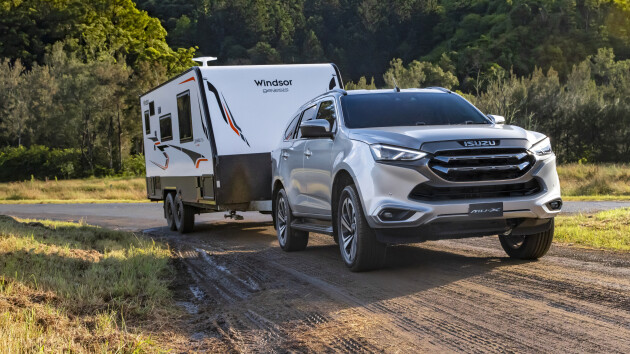 Advice
AdviceTowing: How much can my large SUV tow?
The ability to tow bigger loads is one of the primary ‘reasons for purchase’ of large SUVs, so we’ve compiled a handy guide just how much the most popular mainstream models can haul
-
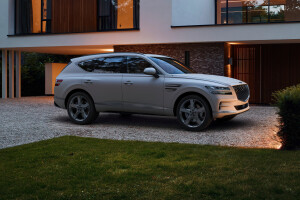 News
News2023 Genesis GV80 pricing and features
The prestige large SUV has been updated for the new model year, with retuned adaptive suspension and other minor enhancements
-
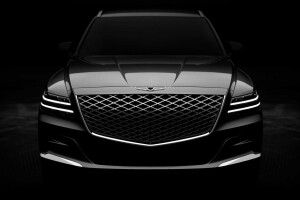 News
News2023 Genesis GV80 Coupe teased in Easter egg
Two future SUVs from Genesis appear to have made an appearance in a new video from the carmaker
-
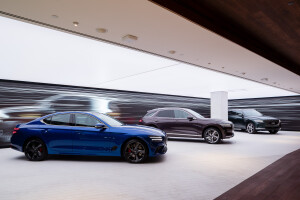 News
NewsGenesis opens second Australian studio in Melbourne
Luxury brand launches second Australian location
-
.jpg)
Genesis GV80 six-seater set for unveiling this year
-
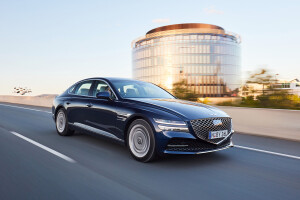
Genesis G80 and GV80 recalled over fuel leak
-
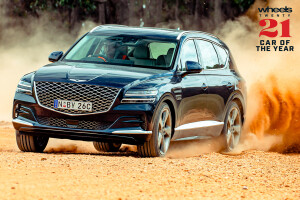
Genesis GV80 at Car of the Year 2021
-
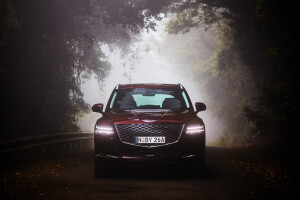
Genesis backtracks on no-dealership model


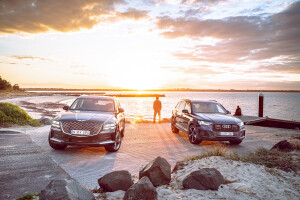
.jpg)
